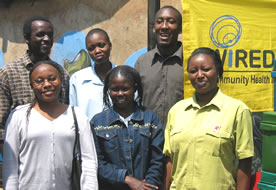|
WiRED International has been providing medical information to help slow the spread of HIV/AIDS in many areas of Kenya for years. WiRED plans to enhance its prevention program in Kenya with new computers and educational material by launching a fundraising campaign to build four additional CHICs, two in Kibera, the massive slums of Nairobi.
Frequently Asked Questions
|
|
Q. What is the Kenyan Community Health Information Center (CHIC) program?
A. The CHIC program brings accurate HIV/AIDS and other health information directly to grassroots communities in Kenya through computer-based training programs and libraries.
Q. Why do the CHICs focus on prevention?
A. The HIV/AIDS epidemic is easier to prevent than to treat. Unlike in many other countries, the overall rate of new infection is on the rise in Kenya, according to a 2008 UNAIDS/WHO report.
Q. Arenít antiretroviral (ARV) medications addressing the problem?
A. These medications can help people infected with HIV to feel better and live longer. And, although ARVs may reduce transmission rates, they can't entirely prevent the spread of the disease. People taking ARVs also may experience side effects and will need to take these medications every day for the rest of their lives.
Q. Why use computers?
A. Computers make it possible to offer engaging, tailored, age-specific information. Computers also appeal to young people who often spend hours looking through the material.
|
Q. How do people know how to find the information they need?
A. Trained staff help visitors find health information on the computers. Where appropriate, staffers may also direct people to health clinics for services. The combination of technology and human intervention has proven highly successful.
Q. Has this been tried previously?
A. Beginning in 2001, WiRED developed a hugely successful network of 19 CHICs in Kenya over a four-year period with funding from a U.S. National Institutes of Health developmental grant.
Q. What has this project accomplished so far?
A. Thanks to WiREDís CHICs, about a million Kenyans have had access to HIV/AIDS prevention information and other health-related topics.
Q. How cost-effective is this project?
A. It costs a few pennies to provide prevention training to a Kenyan youth. It costs thousands of dollars over a lifetime to treat a person with HIV/AIDS. Prevention is far less expensive not only in terms of dollars spent, but also in terms of human suffering.
Read more detailed information about our Kenya fundraising project.
|
|
Kibera in Nairobi, Kenya

WiRED Team in Kibera, September 2003
Kibera, Kenya's largest slum, is one area where WiRED plans to establish two additional CHICs as part of its HIV/AIDS prevention efforts.
Read more about Kibera and view compelling videos that demonstrate the great need for WiRED's services.
Editing by Annie Stuart and Kate Mayer; layout by Brian Colombe.
^ Back to the Top
|



